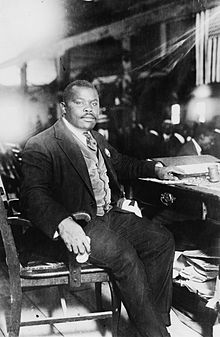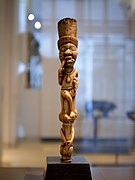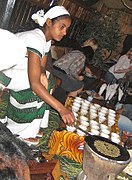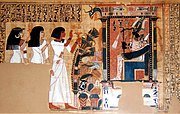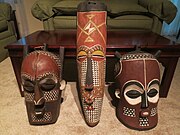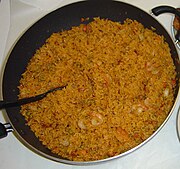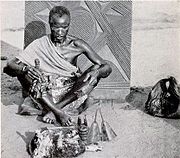Portal:Pan-Africanism
IntroductionWelcome to the Pan-Africanism portal!
Bienvenue sur le portail panafricanisme!   Pan-Africanism is a worldwide movement that aims to encourage and strengthen bonds of solidarity between all indigenous peoples and diasporas of African ancestry. Based on a common goal dating back to the Atlantic slave trade, the movement extends beyond continental Africans with a substantial support base among the African diaspora in the Americas and Europe. Pan-Africanism can be said to have its origins in the struggles of the African people against enslavement and colonization and this struggle may be traced back to the first resistance on slave ships—rebellions and suicides—through the constant plantation and colonial uprisings and the "Back to Africa" movements of the 19th century. Based on the belief that unity is vital to economic, social, and political progress, it aims to "unify and uplift" people of African ancestry. (Full article...) Selected articleAfrican philosophy is philosophy produced by African people, philosophy that presents African worldviews, or philosophy that uses distinct African philosophical methods. African philosophers may be found in the various academic fields of philosophy, such as metaphysics, epistemology, moral philosophy, and political philosophy. African philosophy can also be defined as any epistemic endeavor that attempts to understand the world from an African perspective. It is therefore not just about Africa but about the world even if the location of the subject is Africa. Selected biography
Marcus Mosiah Garvey Jr. ONH (17 August 1887 – 10 June 1940) was a Jamaican-born political leader, publisher, journalist, entrepreneur, and orator. He was President-General of the Universal Negro Improvement Association and African Communities League (UNIA-ACL). He also was President and one of the directors of the Black Star Line, a shipping and passenger line incorporated in Delaware. The Black Star Line went bankrupt and Garvey was imprisoned for mail fraud in the selling of its stock. His movement then rapidly collapsed. Prior to the 20th century, leaders such as Prince Hall, Martin Delany, Edward Wilmot Blyden, and Henry Highland Garnet advocated the involvement of the African diaspora in African affairs. Garvey was unique in advancing a philosophy to inspire a global mass movement and economic empowerment focusing on Africa known as Garveyism. Garveyism would eventually inspire others, ranging from the Nation of Islam to the Rastafari movement (which proclaim Garvey as a prophet) and the Black Power Movement of the 1960s. Selected history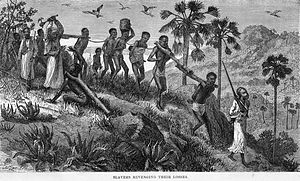 The Arab slave trade was the intersection of slavery and trade in the Arab world, mainly in Western Asia, North Africa, East Africa and Europe. This barter occurred chiefly between the medieval era and the early 20th century. The trade was conducted through slave markets in these areas, with the slaves captured mostly from Africa's interior and Southern Europe. Selected cultureThe culture of Africa is varied and manifold, consisting of a mixture of countries with various tribes that each have their own unique characteristic from the continent of Africa. It is a product of the diverse populations that today inhabit the continent of Africa and the African Diaspora. African culture is expressed in its arts and crafts, folklore and religion, clothing, cuisine, music and languages. Expressions of culture are abundant within Africa, with large amounts of cultural diversity being found not only across different countries but also within single countries. Even though African cultures are widely diverse, it is also, when closely studied, seen to have many similarities. For example, the morals they uphold, their love and respect for their culture as well as the strong respect they hold for the aged and the important i.e. Kings and Chiefs. Africa has influenced and been influenced by other continents. This can be portrayed in the willingness to adapt to the ever-changing modern world rather than staying rooted to their static culture. The Westernized few, persuaded by European culture and Christianity, first denied African traditional culture, but with the increase of African nationalism, a cultural recovery occurred. The governments of most African nations encourage national dance and music groups, museums, and to a lower degree, artists and writers. Selection of images depicting African culture
Selected imagesOrganisationsAll-African People's Revolutionary Party · African Society for Cultural Relations with Independent Africa · African Unification Front · African Union · African Queens and Women Cultural Leaders Network · Conseil de l'Entente · Convention People's Party · East African Community · Economic Freedom Fighters · Global Afrikan Congress · International African Service Bureau · International League for Darker People · Organisation of African Unity · Pan African Association · Pan-African Congress · Pan Africanist Congress of Azania · Rassemblement Démocratique Africain · Pan Africa Chemistry Network · Pan African Federation of Accountants · Pan-African Freedom Movement for East and Central Africa · Sahara and Sahel Observatory · UNIA-ACL · ZANU–PF
See also
& Festivals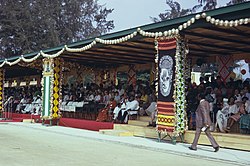 Photo by Helinä Rautavaara (1977) Publications
Films and TVAudios and videosDid you know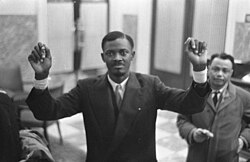 ...that during the tumultuous Year of Africa, seventeen countries gained independence, South Africans began armed resistance to apartheid, and Patrice Lumumba (pictured) gained and lost his freedom?
Selected quotesIn addressing the first ever conference of the Organization of African Unity (1st May 1963). The Gambian Pan-Africanist and nationalist Alieu Ebrima Cham Joof delivered the following message:
Pan-Africanism topicsCategoriesThings you can do
Related portalsAssociated WikimediaThe following Wikimedia Foundation sister projects provide more on this subject:
Discover Wikipedia using portals | |||||||||||||||||||||||||

